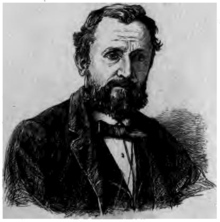James Thomson (poet, born 1834)

James Thomson (23 November 1834 – 3 June 1882), who wrote under the pseudonym Bysshe Vanolis, was a Scottish Victorian-era poet famous primarily for the long poem The City of Dreadful Night (1874), an expression of bleak pessimism in a dehumanized, uncaring urban environment.
Life
Thomson was born in Port Glasgow, Scotland, and, after his father suffered a stroke, he was sent to London where he was raised in an orphanage, the Royal Caledonian Asylum on Chalk (later Caledonian after the asylum) Road near Holloway. He spoke with a London accent. He received his education at the Caledonian Asylum and the Royal Military Academy and served in Ireland, where in 1851, at the age of 17, he made the acquaintance of the 18-year-old Charles Bradlaugh, who was already notorious as a freethinker, having published his first atheist pamphlet a year earlier.[1]
More than a decade later, Thomson left the military and moved to London, where he worked as a clerk. He remained in contact with Bradlaugh, who was by now issuing his own weekly National Reformer, a "publication for the working man". For the remaining 19 years of his life, starting in 1863, Thomson submitted stories, essays and poems to various publications, including the National Reformer, which published the sombre poem which remains his most famous work.
The City of Dreadful Night came about from the struggle with insomnia, alcoholism and chronic depression which plagued Thomson's final decade. Increasingly isolated from friends and society in general, he even became hostile towards Bradlaugh. In 1880, nineteen months before his death, the publication of his volume of poetry, The City of Dreadful Night and Other Poems elicited encouraging and complimentary reviews from a number of critics, but came too late to prevent Thomson's downward slide.
Thomson's remaining poems rarely appear in modern anthologies, although the autobiographical Insomnia and Mater Tenebrarum are well-regarded and contain some striking passages. He admired and translated the works of the pessimistic Italian poet Giacomo Leopardi (1798–1837), but his own lack of hope was darker than that of Leopardi. He is considered by some students of the Victorian age as the bleakest of that era's poets. He died in London at the age of 47.
In 1889, seven years after Thomson's death, Henry Stephens Salt wrote his first major biography, The Life of James Thomson (B.V.).
Thomson's pseudonym, Bysshe Vanolis, derives from the names of the poets Percy Bysshe Shelley and Novalis. He is often distinguished from the earlier Scottish poet James Thomson by the letters B.V. after the name.
References
- ↑ American Heritage Dictionary (2004). The Riverside Dictionary of Biography. Houghton Mifflin Reference Books. p. 785. ISBN 978-0-618-49337-1.
- Attribution
-
 This article incorporates text from a publication now in the public domain: "Thomson, James (1834-1882)". Dictionary of National Biography. London: Smith, Elder & Co. 1885–1900.
This article incorporates text from a publication now in the public domain: "Thomson, James (1834-1882)". Dictionary of National Biography. London: Smith, Elder & Co. 1885–1900.
External links
| Wikimedia Commons has media related to James Thomson (B.V.). |
| Wikiquote has quotations related to: James Thomson (poet, born 1834) |
| Wikisource has original works written by or about: James Thomson (1834-1882) |
- James Thomson Poetry Works
- Leonard, Tom. "James Thomson ("BV")". Archived from the original on 2011-09-29. (Essay on The City of Dreadful Night)
- Works by James Thomson at Project Gutenberg
- Works by or about James Thomson at Internet Archive
- Works by James Thomson at LibriVox (public domain audiobooks)
